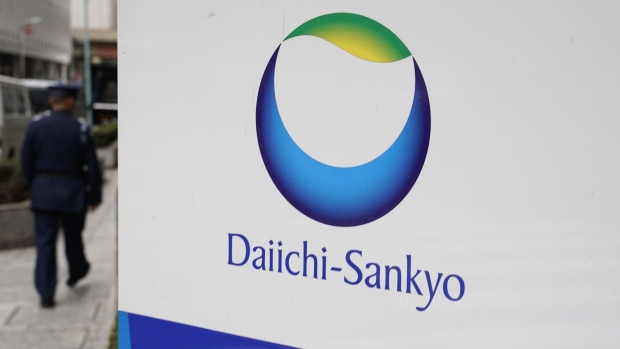Feb 21, 2022
Daiichi Soars as Astra’s Blockbuster Bet on Cancer Drug Pays Off
, Bloomberg News

(Bloomberg) -- Daiichi Sankyo Co. posted its biggest gain in more than 18 months after the breast cancer drug it’s developing with AstraZeneca Plc helped patients with advanced disease live longer, potentially expanding treatment options for the most common cancer in women.
The stock rose as much as 11% in Tokyo trading on Tuesday morning, the biggest intraday gain since March 19, 2020, while AstraZeneca rose 4% in London on Monday. The benchmark Topix index fell as much as 1%.
Results from the pivotal trial showed Enhertu boosted survival in patients with a type of tumor called HER2-low that had spread widely or couldn’t be removed surgically, the Japanese drugmaker and AstraZeneca said Monday. It’s the first time such a therapy has shown a mortality benefit in patients with lower levels of the protein called HER-2 that can drive cancer growth, a group that accounts for up to 55% of all breast cancers.
The drug, known as an antibody conjugate, was discovered by Daiichi Sankyo. AstraZeneca agreed to pay as much as $6.9 billion in 2019 to jointly develop the medicine, its biggest deal in more than a decade, betting that the therapy designed to attack cancer cells in the body without damaging healthy ones would work.
The result is the first to show that Enhertu could improve survival for some breast cancer patients whose only other option is chemotherapy after progressing on hormone therapy. No new safety concerns were found with the targeted therapy during the study, which will be presented at a future medical meeting, the companies said.
“We regard this as a very positive development,” said Hidemaru Yamaguchi, a health-care analyst at Citigroup said in a note to clients.
Enhertu is the latest in a family of treatments that attack tumors bearing the HER2 protein. While the current powerful targeted treatments such as Roche Holding AG’s Herceptin are effective only for HER2 positive patients, the companies have said Enhertu has the potential to benefit both HER2 positive and negative patients. Success in those cancers could triple the number of patients who get targeted therapies, according to analysts.
The study is one of two trials Daiichi Sankyo and AstraZeneca are running to test the medicine in HER2-low breast cancer patients who have gone through chemotherapy. The companies are working on global regulatory submissions, the statement said.
©2022 Bloomberg L.P.